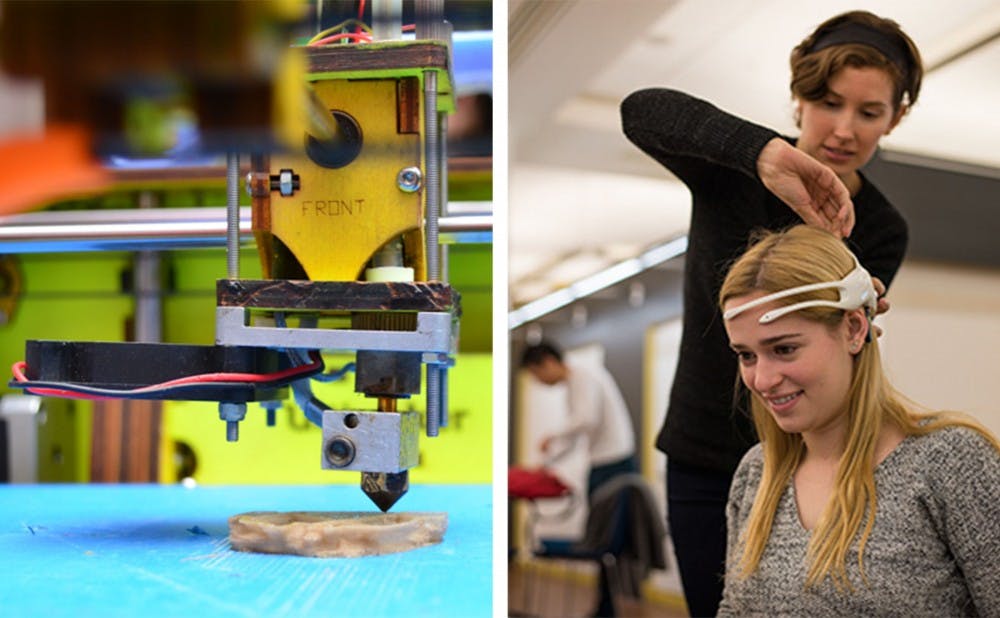Neither career lawyers nor fresh-faced premeds are excluded from Science, Law & Policy Laboratory, which is beginning its second year exploring science in a law and policymaking setting.
Researchers at the SLAPLAB focus on the social impact of new technology—like direct-to-consumer genetic tests and wearable EEG headsets—recognizing that advancements in modern science have outstripped the domain of current legislation. Nita Farahany, director of the Duke Initiative for Science & Society and professor of law and philosophy who also directs the SLAPLAB, noted the importance of combining science research with policy research as the two become increasingly intertwined and using a more numbers-driven approach to create laws.
“The intuitions that you come into a project with don’t necessarily bear out with the empirical data," Farahany said. "It’s those kinds of surprise findings that show that your gut instincts may be wrong."
Current research projects at the lab involve topics like testing neuroscience devices for meditation and focus, public attitudes toward consumer neuroscience devices and the empirical use of neuroscience in law.
Farahany created the lab last Fall after students and faculty began to take interest in her unique line of research, which looks at applications of neuroscience in the criminal courtroom. Through her work, she strives not only to generate research but to integrate it into practical decision-making.
“There are a lot of important decisions in science policy made without empirical research to guide those decisions," Farahany said. "One of the main purposes of SLAP Lab is to do research that can help and form and shape public policy, in particular science policy, by bringing data to questions that society grapples with.”
Susanne Haga, associate professor of medicine who works with the Duke Initiative for Science & Society, also noted that empirical science needs to be better incorporated into policy and law.
“Everything is evidence-based, or at least that’s the push," Haga said. "Where is the evidence that this thing works? Where is the evidence that if we do something different it’s going to make a change?”
The researchers at the SLAPLAB gather their evidence primarily through surveys distributed on crowdsourcing websites like Amazon Mechanical Turk, which allows people to coordinate the use of human intelligence to perform tasks that computers are currently unable to do. Then, they use statistical software like NVivo to perform qualitative analysis and review the results.
In her project studying 3D printing and intellectual property law, Rosa Castro—SLAPLAB researcher and patent lawyer—said that it can be easy sometimes to get caught up in the theoretical aspects of research. But researchers at the lab think carefully about the best way to present their work outside of an academic audience, whether in a short newspaper article or a briefing to politicians, she explained.
“It’s important for researchers and policymakers to know what the public thinks,” Castro said. “Policy is supposed to be for the people, so it is important for policymakers to know what consumers are afraid of.”
Junior Elish Mahajan works alongside Castro on the 3D printing project and shares a similar outlook.
"[3D printing] is already coming up in Congress. It’s already coming up among world leaders," he said. "So by contributing to the literature, hopefully we’ll be giving a unique point that influences how policy is shaped in the coming years.”
In the future, Farahany said that she wants the lab, which currently has a biological and genomic focus, to delve deeper into high-tech fields like robotics and artificial intelligence.
In addition, the lab may begin joint projects with the Morals, Attitudes & Decision-Making Lab, or MADLAB, at the Kenan Institute of Ethics in the next year. These cross-disciplinary collaborations are crucial to the SLAPLAB, Mahajan said.
“The kind of person that works best [in the SLAPLAB] is someone that’s interested in [science, policy or law], but also interested in all of them combined together," Mahajan said. "It’s the kind of person that wants to see how things connect and how things mix together and the actual, applicable results."
Get The Chronicle straight to your inbox
Signup for our weekly newsletter. Cancel at any time.

